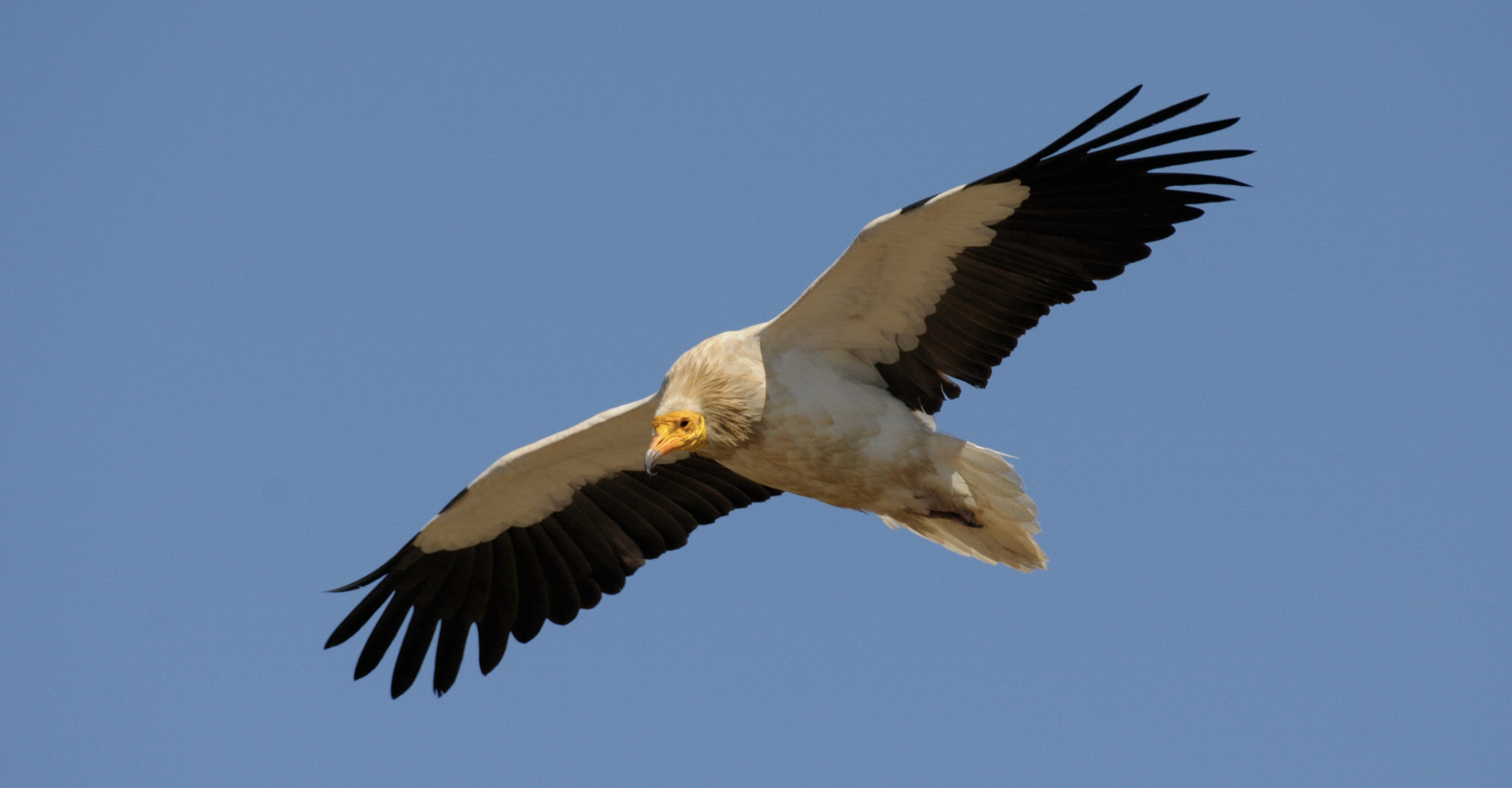
The results from the latest Egyptian Vulture national census in Spain are now available. Ten years after the previous one, SEO BirdLife organised a national census in 2018, as part of their regular monitoring of species in the Spanish red book. Dozens of volunteers and administrations have contributed and monitored cliffs across the country to determine the status of this magnificent vulture. This effort was also supported financially by the VCF, through a grant from the MAVA foundation. This updated census reflects that the population of the species in the country is stable on a general level and the significant declines the species faced at the end of the last century and the beginning of this one halted. However, population trends vary depending on the area.
Egyptian Vultures in Spain
All European vulture species live in Spain, Europe’s vulture stronghold. The Egyptian Vulture has two subspecies in Spain; the Peninsular subspecies is currently listed in the Spanish Catalogue of Threatened Species in the category of Vulnerable and the Canary Islands subspecies in the category of Endangered. Periodic censuses are carried out for these two subspecies by the Autonomous Communities in compliance with the Law on Natural Heritage and Biodiversity. Spain is home to the largest European population of Egyptian Vultures and is a global stronghold for the species with 1,490-1,567 pairs.
Egyptian Vulture Census in Spain 2018 results

The Egyptian Vulture population seems to be stable overall, but there are some exceptions.
In Andalusia, for example, the population of Egyptian Vultures has declined in the last decade, due to poisoning and the impact of large infrastructures such as wind farms. Our partners from Junta de Andalucia and naturalists have been carrying out several actions in the region for years and are leading the fight against poisoning in Europe. But considering that half of Europe’s vultures migrate through Andalusia, more awareness and support are necessary to facilitate their crucial conservation actions. Furthermore, the population of Castile and Leon, which are a bastion of the Iberian population of the Egyptian Vulture, have also declined slightly since the last census. The fantastic canyons of the Douro, but also parts of Burgos, Zamora and Leon have witnessed some rural abandonment, and thus associated changes in habitat. Our LIFE Rupis project in the Douro is working to strengthen the population of the species by reducing the mortality of these birds and increasing their breeding success. Another area where the situation is worrying is the Ebro valley where the density of this species is quite high, and where some mortality has occurred, notably also because of poison.
But it’s not all bad news. In the Cantabrian countryside, from Asturias to the Basque Country, populations seem stable, and there are even new colonisations. A similar trend occurs in the Alto Tajo, where there is one of the best populations of Iberian Egyptian Vultures. A particularly interesting and positive phenomenon is the recovery and new colonization of the species in the northeast of the Iberian Peninsula, starting with the northern mountain ranges of the Valencian Community, Els Ports, and continuing throughout Catalonia. Here populations in Lleida, Girona and the central Catalan regions have been increasing. Finally, there are positive trends in the island populations. In the Canary Islands, thanks to rigorous research, which informed conservation measures, the species is now out of the brink of extinction – an excellent example on how targeted conservation effort can reverse declines in a few decades. In the Balearic Islands, Minorca, with the diligent work of governments and NGOs, hundreds of dangerous electricity poles were secured, and the threat of poisoning declined.
More efforts needed to conserve the species
The Iberian Peninsula holds one of the world’s strongholds of Egyptian Vultures, and it is imperative to tackle threats this species face. Persecution and poisoning still persist due to obsolete mentalities associated with certain hunting and livestock practices. Awareness and efficient enforcement are necessary to change these old patterns and halt these threats.
On the other hand, conservation policies must be established to counteract the abandonment of the countryside. Furthermore, it is urgent to tackle the impacts of infrastructures such as wind farms and powerlines where vultures collide and are electrocuted.
You can download the complete census in Spanish below.
Egyptian Vulture national census Spain 2018
Censo_Alimoche_2018_España.pdf
Adobe Acrobat Document 8.3 MB





